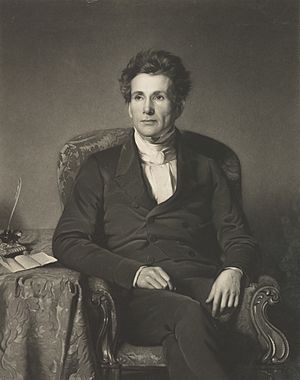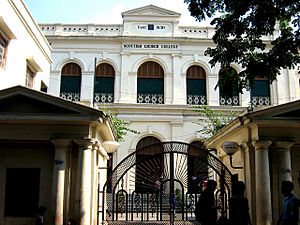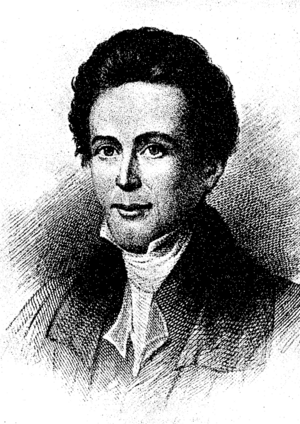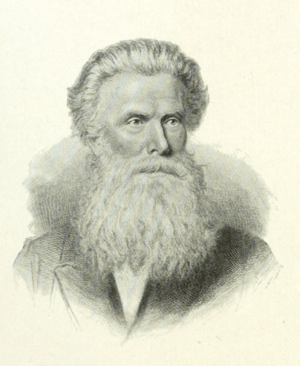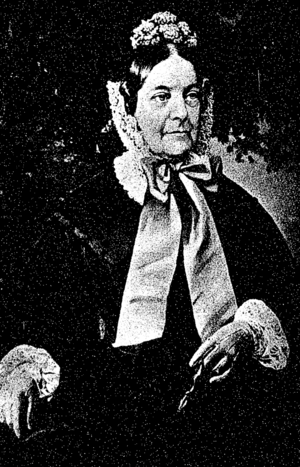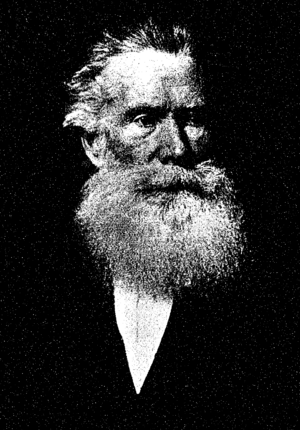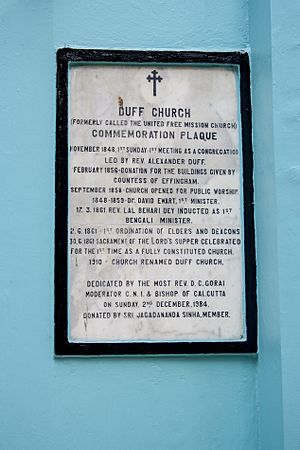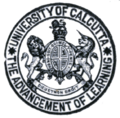Alexander Duff (missionary) facts for kids
Quick facts for kids Alexander Duff |
|
|---|---|
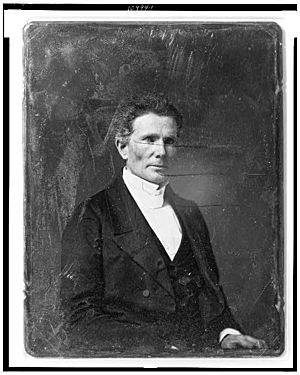
Alexander Duff
|
|
| Personal details | |
| Born | 25 April 1806 Auchnahyle, Perthshire, Scotland |
| Died | 12 February 1878 (aged 71) Sidmouth, Devon, England |
| Spouse | Anne Scott Drysdale (m.1829 - 1865) |
| Children | Rebecca (b.1830), James (b.1831), Alexander (b.1834), Ann (b.1836), William (b.1838) |
| Occupation | Missionary, Teacher |
| Alma mater | University of St. Andrews |
Alexander Duff (born April 25, 1806, died February 12, 1878) was an important Christian missionary in India. He played a big role in creating better education there. He was the first missionary from the Church of Scotland to go to India.
In 1830, he started a school in Calcutta called the General Assembly's Institution. Today, this school is known as the Scottish Church College. He also helped create the University of Calcutta. Alexander Duff was chosen twice to lead the Free Church of Scotland (in 1851 and 1873). He was the only person to hold this position twice.
Contents
Alexander Duff's Early Life and Studies
Alexander Duff was born in a place called Auchnahyle in Perthshire, Scotland. His parents were James Duff and Jean Rattray. He had five brothers and sisters.
He went to school in Moulin, Kirkmichael, and Perth. Then, he studied at the University of St. Andrews. A professor named Thomas Chalmers greatly influenced him. Alexander graduated in 1824. In 1829, he was allowed to preach. Soon after, he became the first official missionary from the Church of Scotland to India. He left Scotland in October 1829 to begin his journey.
Alexander Duff's Mission in India
After a difficult journey where his ship crashed twice, Duff arrived in Calcutta on May 27, 1830. He looked at the local schools and decided that students needed a better education. He also believed teaching in English would be best, instead of local languages.
Duff noticed that Christian missions had mostly reached people from lower social groups. He wanted to reach the wealthier Hindu and Muslim communities. He thought that offering a Western education would attract their children. This way, he could share Christian ideas with them.
His work had a big impact:
- It changed how the government of India thought about education.
- It showed Christian churches back home that education could be a way to spread their message.
- It helped high-caste Hindus learn about Christian ideas.
Duff taught Biblical studies along with science. He hoped students would see problems in Hinduism and choose Christianity. However, most students did not convert. Hindus often saw Western knowledge and their own religion as separate but not conflicting.
Why English Education Was Important
Duff opened a school that taught many subjects, from basic lessons to university-level studies, alongside the Bible. He used English as the main language. He believed English was the key to understanding Western knowledge.
Alexander Duff had a theory called the "downward filter theory." He thought that if he educated the middle and upper classes, Christian knowledge would eventually spread to everyone else. He also believed local languages were important for reaching many people, but he saw English as more advanced.
In 1835, the British government in India agreed with Duff's ideas. They decided that higher education should focus on European science and literature, and that money for education should be used for English teaching.
Some British people in India, called "Orientalists," valued India's traditional learning. They disagreed with Duff's strong focus on Western education. In 1839, Lord Auckland, the leader of India, tried to find a middle ground.
Even so, English became a powerful tool. It helped Indians understand and work within the British government system. This opportunity eventually helped India move towards self-rule.
Founding Educational Institutions
Soon after arriving in India in 1830, Duff opened his first school in Calcutta. An important Hindu man, Feringhi Kamal Bose, provided the house. This school quickly grew into a missionary college, known as the General Assembly's Institution.
In 1834, Duff returned to Britain because he was not well. While there, he got his church to approve his education plans. He also made many people interested in foreign missions.
In 1836, the Calcutta school moved to a new house. On February 23, 1837, they laid the foundation stone for a new building just for the mission. The building was finished in 1839.
Duff came back to India in 1840. By then, his school had 600 Indian students. In 1843, there was a big split in the Church of Scotland. Duff joined the Free Church. He gave up the original college buildings. But he bravely started a new school, which became the Free Church Institution.
In 1857, when the University of Calcutta was created, Duff's Free Church Institution was one of the first schools to join it. Duff also served on the university's first leadership group. Later, in 1908, the two schools Duff founded (General Assembly's Institution and Free Church Institution) combined to form the Scottish Churches' College. After 1929, it became the Scottish Church College.
In 1844, the governor-general, Viscount Hardinge, allowed people who studied in schools like Duff's to get government jobs. This was a big step. In the same year, Duff helped start the Calcutta Review, a magazine he edited from 1845 to 1849.
Many important Indian figures studied at Duff's schools. These included Rev. Lal Behari Dey, who wrote popular books, and Krishna Mohan Banerjee, who became a leader at Calcutta University.
Alexander Duff's Later Years
In 1849, Duff returned to Scotland. In 1851, he was chosen to lead the Moderator of the General Assembly of the Free Church of Scotland.
He spoke to different government groups about education in India. This led to important changes in schools, including primary and secondary education, technical training, and schools for girls. In 1854, Duff visited the United States. He received an honorary degree from what is now New York University.
Duff returned to India in 1856. The Indian Mutiny (a rebellion) happened the next year. He wrote letters about this time, which were published in a book. During this period, Duff spent a lot of time helping the University of Calcutta. He influenced its exam system and the importance of science. In 1863, he was offered the job of vice-chancellor of the university, but his health made him leave India. A building called Duff Hall was built in Calcutta to remember his work.
In 1864, Duff visited South Africa. When he returned, he became a leader for the Free Church's foreign missions. He helped create the Anglo-Indian Christian Union in 1870. He also raised money to create a special teaching position at New College, Edinburgh, and became its first professor. He helped other missions in places like Lake Nyassa and Syria.
In 1873, the Free Church faced a possible split. Duff was called to lead the church through this difficult time. He also helped form an alliance of Presbyterian churches.
Alexander Duff passed away in Sidmouth, England, on February 12, 1878. He is buried with his wife in Grange Cemetery in Edinburgh. In his will, he left money to create a special lecture series on foreign missions at New College.
Alexander Duff's Family Life
Alexander Duff married Anne Scott Drysdale in 1829. She passed away in 1865. They had five children:
- Rebecca Jane, born in 1830. She married John Watson in 1852 and died in 1896.
- James Murray, born in 1831, died in 1832.
- Alexander Groves, born in 1834, became a doctor.
- Ann Jemima, born in 1836, died in 1841.
- William Pirie, born in 1838, became a merchant in Calcutta and died in 1899.
Alexander Duff's Lasting Impact
Alexander Duff had a huge impact on education and government in India. His ideas changed Indian education very quickly. Other missionaries, like John Wilson, copied his methods. Duff spent 25 years in India, setting up Western-style schools that were welcomed by leaders like Ram Mohan Roy.
Duff helped create a system that influenced education in India for many years. Because his schools mainly served the Hindu middle class, he got attention from the government. This helped his ideas spread. His successful college led to the founding of the Calcutta Medical College. Before, higher-caste Hindus were not allowed to touch dead bodies, which stopped them from studying medicine. Students from Duff's college felt that their Western education had "freed their minds from prejudice." This allowed more Indians to become doctors, improving healthcare in India.
Duff believed that educating Indians with Western ideas would help them see problems in their own religion and become Christians. However, Hinduism was very strong and did not change easily. His efforts did not lead to many people converting to Christianity. Hindus accepted learning about the Christian Bible because they were confident in their own faith. Hinduism was not just a religion but a whole culture, and British ideas were not enough to change it completely.
Because Alexander Duff was highly respected, his character influenced his students and friends. His teaching did lead to some reform movements within Hinduism. Also, Duff's work helped more Indians get important government jobs. This experience was vital for the Indian government after India gained independence in 1947.
A church was built in 1848 and named Duff Church in 1910 to honor Alexander Duff. Another church in Kirkmichael, Perth and Kinross, Scotland, is called Duff Memorial Church in his memory.
Images for kids
-
Alexander Duff memorial cross at Pitlochry Parish Church.
 | Chris Smalls |
 | Fred Hampton |
 | Ralph Abernathy |


